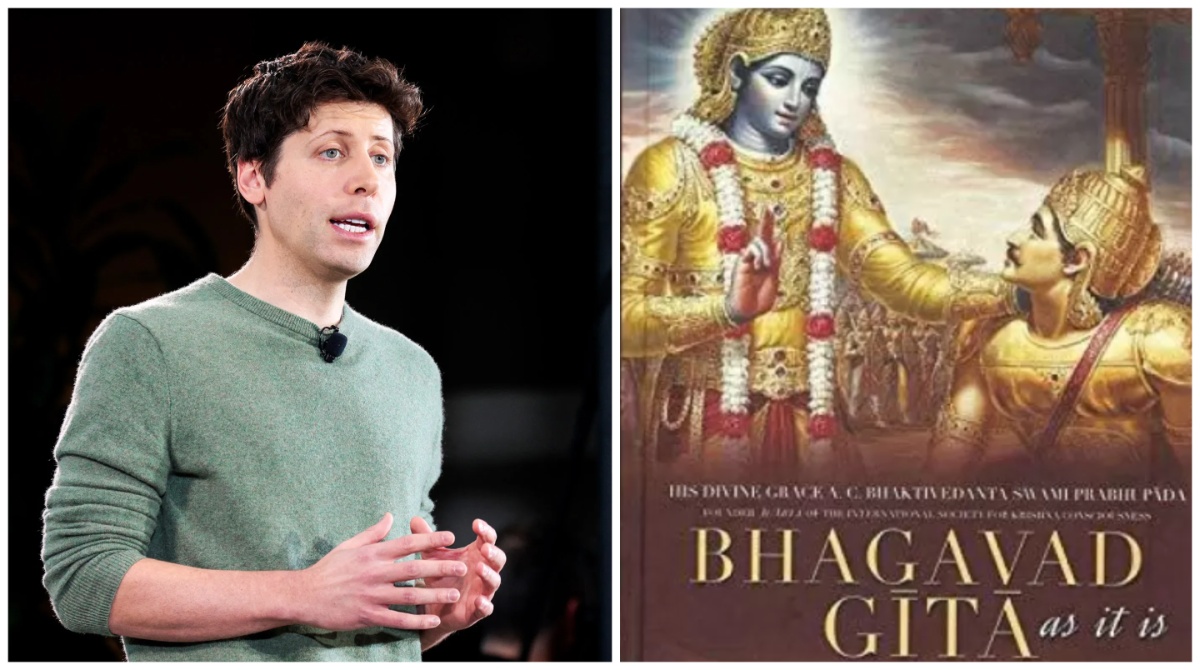Recent years have seen a resurgence of Hindu philosophy in India, but it appears that foreign tech CEOs are enamored too.
OpenAI CEO Sam Altman has quoted the Hindu text Bhagavad Gita on X. “You have a right to your actions, but never to your actions’ fruits,” the ChatGPT creator posted last night. The post went viral, and has been shared over 1.4 thousand times on the platform.

Altman’s post is a summary of Bhagavad Gita’s 47th verse from the 2nd chapter. “Karmanye vadhikaraste Ma Phaleshu Kadachana,
Ma Karmaphalaheturbhurma Te Sangostvakarmani,” the verse says. The Sanskrit translates to “You have the right to work only but never to its fruits.” The verse was spoken by Lord Krishna to Arjuna, when he was faltering in his duty to go to battle against his relatives.
This isn’t the first time that Altman has appeared to quote Hindu philosophy. He’s previously said he believes in the absolute equivalence of Atman and Brahman, which is the core of Hinduism’s Advaita Vedanta school of thought. It refers to the idea that Brahman, or the infinite ultimate reality, is alone ultimately real, while atman, which is the individual self or soul, is merely a manifestation of it. The apparent separation of Brahman and Atman is viewed as an illusion caused by ignorance (avidya). Through self-inquiry, meditation, and a deep understanding of the nature of reality, one can realize the oneness between Atman and Brahman, and attain moksha.

Altman has also indicated that he’s studied Hindu philosophy. When asked on Twitter as to what his source material for Advaita study was, he replied “I think Maharshi got it perfect with “ask yourself, who am i?” Takes a while though.” Altman is referring to Hindu sage Ramana Maharshi, who’d lived between 1879 and 1950, and had attracted both Indian and western followers.

And much of this knowledge might have been acquired first-hand. Altman has indicated that he’s lived in an Ashram after selling his first company, Loopt. “I was like, I’m gonna go to an ashram for a while, and it changed my life,” he’d said.
Altman seems to have studied Hindu thought pretty deeply, including the Bhagavad Gita, Advaita Vedanta philosophy and teachings of Ramana Maharishi. But he isn’t the only tech giant who appear to be a keen follower of Hindu philosophy. Apple’s Steve Jobs, most famously, had visited India in his youth in search of Neem Karoli Baba, and had returned to the US barefoot and wearing saffron robes of a sadhu, and Meta’s Mark Zuckerberg too has looked at Neem Karoli Baba for inspiration. Among prominent scientists, Robert Oppenheimer had also read the Bhagavad Gita, and had quoted it after the first nuclear test, saying “I am become death, the destroyer of worlds”. The world has changed fundamentally over the last century or so, but some of the people who’ve been at the forefront of this change seem to continue to lean on Hinduism’s millennia-old wisdom to help guide their actions.
